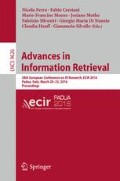Abstract
Skip-Gram word embeddings, estimated from large text corpora, have been shown to improve many NLP tasks through their high-quality features. However, little is known about their robustness against parameter perturbations and about their efficiency in preserving word similarities under memory constraints. In this paper, we investigate three post-processing methods for word embeddings to study their robustness and memory efficiency. We employ a dimensionality-based, a parameter-based and a resolution-based method to obtain parameter-reduced embeddings and we provide a concept that connects the three approaches. We contrast these methods with the relative accuracy loss on six intrinsic evaluation tasks and compare them with regard to the memory efficiency of the reduced embeddings. The evaluation shows that low Bit-resolution embeddings offer great potential for memory savings by alleviating the risk of accuracy loss. The results indicate that post-processed word embeddings could also enhance applications on resource limited devices with valuable word features.
Access this chapter
Tax calculation will be finalised at checkout
Purchases are for personal use only
References
Turney, P.D., Pantel, P.: From frequency to meaning: vector space models of semantics. J. Artif. Intell. Res. 37(1), 141–188 (2010)
Bengio, Y., Ducharme, R., Vincent, P., Janvin, C.: A neural probabilistic language model. J. Mach. Learn. Res. 3, 1137–1155 (2003)
Collobert, R., Weston, J., Bottou, L., Karlen, M., Kavukcuoglu, K., Kuksa, P.: Natural language processing (almost) from scratch. J. Mach. Learn. Res. 12, 2493–2537 (2011)
Mnih, A., Hinton, G.: Three new graphical models for statistical language modelling. In: ICML, pp. 641–648. ACM, June 2007
Huang, E.H., Socher, R., Manning, C.D., Ng, A.Y.: Improving word representations via global context and multiple word prototypes. In: 50th Annual Meeting of the Association for Computational Linguistics, pp. 873–882. ACL, July 2012
Baroni, M., Dinu, G., Kruszewski, G.: Dont count, predict! a systematic comparison of context-counting vs. context-predicting semantic vectors. In: 52nd Annual Meeting of the Association for Computational Linguistics, pp. 238–247 (2014)
Mikolov, T., Chen, K., Corrado, G., Dean, J.: Efficient estimation of word representations in vector space (2013). arXiv.org
Mikolov, T., Yih, W.T., Zweig, G.: Linguistic regularities in continuous space word representations. In: HLT-NAACL, pp. 746–751, June 2013
Levy, O., Goldberg, Y.: Neural word embedding as implicit matrix factorization. In: Advances in Neural Information Processing Systems, pp. 2177–2185 (2014)
Goldberg, Y., Levy, O.: word2vec Explained: deriving Mikolov et al’.s negative-sampling word-embedding method. arXiv preprint (2014). arxiv:1402.3722
Van der Maaten, L., Hinton, G.: Visualizing data using t-SNE. J. Mach. Learn. Res. 9(2579–2605), 85 (2008)
Chen, Y., Perozzi, B., Al-Rfou, R., Skiena, S.: The expressive power of word embeddings. In: Speech and Language Proceeding Workshop, ICML, Deep Learning for Audio (2013)
Finkelstein, L., Gabrilovich, E., Matias, Y., Rivlin, E., Solan, Z., Wolfman, G., Ruppin, E.: Placing search in context: the concept revisited. In: 10th International Conference on World Wide Web, pp. 406–414, ACM, April 2001
Bruni, E., Tran, N.K., Baroni, M.: Multimodal distributional semantics. J. Artif. Intell. Res. (JAIR) 49, 1–47 (2014)
Schnabel, T., Labutov, I., Mimno, D., Joachims, T.: Evaluation methods for unsupervised word embeddings. In: Proc. Emp. Met. Nat. Lang. (2015)
Ling, Y., Dyer, G.L.C.: Evaluation of word vector representations by subspace alignment. In: Proc. Emp. Met. Nat. Lang., pp. 2049–2054, ACL, Lisbon (2015)
Saad, Y.: Iterative methods for sparse linear systems. Siam (2003)
Acknowledgments
The presented work was developed within the EEXCESS project funded by the European Union Seventh Framework Programme FP7/2007-2013 under grant agreement number 600601.
Author information
Authors and Affiliations
Corresponding author
Editor information
Editors and Affiliations
Rights and permissions
Copyright information
© 2016 Springer International Publishing Switzerland
About this paper
Cite this paper
Jurgovsky, J., Granitzer, M., Seifert, C. (2016). Evaluating Memory Efficiency and Robustness of Word Embeddings. In: Ferro, N., et al. Advances in Information Retrieval. ECIR 2016. Lecture Notes in Computer Science(), vol 9626. Springer, Cham. https://doi.org/10.1007/978-3-319-30671-1_15
Download citation
DOI: https://doi.org/10.1007/978-3-319-30671-1_15
Publisher Name: Springer, Cham
Print ISBN: 978-3-319-30670-4
Online ISBN: 978-3-319-30671-1
eBook Packages: Computer ScienceComputer Science (R0)

